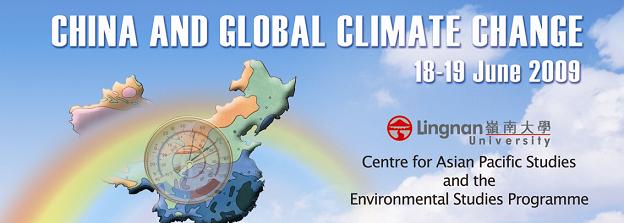
Event Title
Conference on China and Global Climate Change : Reconciling International Fairness and Protection of the Atmospheric Commons
Location
AM310, Lingnan University
Start Date
19-6-2009 11:00 AM
End Date
19-6-2009 12:30 PM
Language
English
Description
Food production in China is a fundamental component of the national economy and driver of agricultural policy. Sustaining and increasing output to meet growing demand faces significant challenges including, climate change, increasing population, agricultural land loss, and competing demands for water. The integrated impacts of climate change, water availability, and other socioeconomic pressures on China’s food production are poorly understood. By linking crop and water simulation models and two scenarios of climate and socioeconomic change (downscaled from IPCC SRES A2 and B2) we demonstrate that under these scenarios out to 2050 the absolute effects of climate change alone are modest and the interactive effects of other drivers are negative, leading to overall changes in total production. Outcomes are highly dependent on socioeconomic development pathways and the effects of CO2 fertilization on crop yields which may almost wholly offset the decreases in production. We find that water availability plays a significant limiting role on potential cereal production. Per capita cereal production falls in all cases, by up to 40% of the current baseline. These results are likely to be optimistic because the CO2 crop yield response function is highly uncertain and the effects of extreme events on crop growth and water availability are likely to be underestimated.
Document Type
Presentation
Recommended Citation
Xiong, W., Conway, D., Lin, E., Xu, Y., Ju, H., Jiang, J., ... Li, Y. (2009). The integrated impacts of climate change, water availability and socio-economic development on China’s food production. In China and global climate change: Proceedings of the conference held at Lingnan University, Hong Kong, 18-19 June 2009 (pp. 444-459). Centre for Asian Pacific Studies and the Environmental Studies Programme, Lingnan University, Hong Kong.
Included in
The integrated impacts of climate change, water availability and socio-economic development on China’s food production
AM310, Lingnan University
Food production in China is a fundamental component of the national economy and driver of agricultural policy. Sustaining and increasing output to meet growing demand faces significant challenges including, climate change, increasing population, agricultural land loss, and competing demands for water. The integrated impacts of climate change, water availability, and other socioeconomic pressures on China’s food production are poorly understood. By linking crop and water simulation models and two scenarios of climate and socioeconomic change (downscaled from IPCC SRES A2 and B2) we demonstrate that under these scenarios out to 2050 the absolute effects of climate change alone are modest and the interactive effects of other drivers are negative, leading to overall changes in total production. Outcomes are highly dependent on socioeconomic development pathways and the effects of CO2 fertilization on crop yields which may almost wholly offset the decreases in production. We find that water availability plays a significant limiting role on potential cereal production. Per capita cereal production falls in all cases, by up to 40% of the current baseline. These results are likely to be optimistic because the CO2 crop yield response function is highly uncertain and the effects of extreme events on crop growth and water availability are likely to be underestimated.

